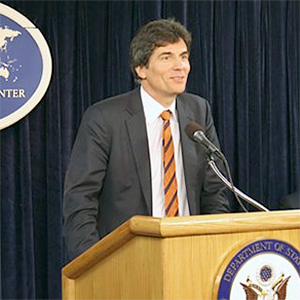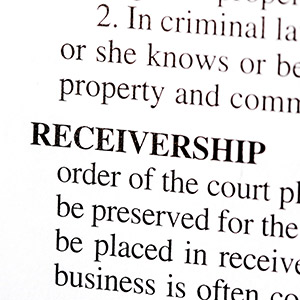
Jose Fernandez (pictured), who advocated for Kimberley Process (KP) and wider industry reform when he was assistant secretary of state for economic, energy, and business affairs under the Obama administration, has been nominated to rejoin the U.S. State Department as an undersecretary.
That’s a higher-level role than he had last time—and could mean a renewed focus on responsible sourcing in both the diamond and jewelry industry. As assistant secretary, Fernandez took a great interest in the KP, and the United States spent a year chairing the certification scheme. He also occasionally expressed impatience with industry reform efforts.
“The diamond and jewelry trade as a whole must do more,” he said at a Jewelers Vigilance Committee luncheon in 2014. “In the future, consumers will demand confidence that the gems in their necklace, the clothes that they wore, or the diamonds that newlyweds seal their love with were not the fruit of the suffering and death of those unfortunate enough to toil in crumbling mines or in a locked-down garment factory.”
The Biden administration may also increase enforcement of Dodd–Frank Section 1502, which mandates public companies disclose whether they use conflict minerals from the Democratic Republic of Congo, including gold.
“[A] newly re-formulated Conflicts Mineral Rule could serve as the basis for enforcement actions against issuers whose conflict mineral due diligence or disclosures are found lacking,” read a recent note from law firm Cahill Gordon & Reindel.
While the Trump administration officially opposed Section 1502, in 2019 a State Department official warned industry leaders that a “crackdown,” including possible new regulations, might come if jewelry businesses weren’t able to guarantee the sourcing of all their materials—something the industry largely wasn’t able to do then, and still isn’t able to do now. But that crackdown never came, aside from scattered executive orders targeting specific actors.
Brad Brooks-Rubin, who served as special advisor for conflict diamonds at the State Department when Fernandez was there—and is now managing director of the Sentry, part of the Enough Project—expects to see more focused and prolonged engagement on these issues now that his old boss is back.
“One of his mantras at the State Department is he believes in engagement with industry,” says Brooks-Rubin. “He is very thoughtful, he really wants to understand issues, he traveled to Jerusalem and everywhere else, and he wants to know what role he could play in moving them forward.
“But if he gets industry leaders around the table, like he did 10 years ago, and asks what progress has been made, I don’t think he’ll hear much different. The industry is dealing with the same issues it dealt with then. Other than a few companies, the industry continues to lag behind.”
Which brings me to a compelling webinar I watched this week, held by members of the Kimberley Process Civil Society Coalition.
I recommend everyone watch it, but it’s not for the faint of heart, as it includes some unpleasant and disturbing testimony from Ibrahim, an activist in Sierra Leone, and Farai Maguwu, founding director of Zimbabwe’s Centre for Natural Resource Governance, who has long been a critic of that country’s mining sector, particularly in the Marange region. (Currently, Marange diamonds cannot legally be imported in the United States, by decree of both the U.S. Treasury Department and the U.S. Customs and Border Protection.)
Also on the call were two industry leaders—Edward Asscher, president of the World Diamond Council (WDC), and Iris Van der Veken, executive director of the Responsible Jewellery Council (RJC). The WDC represents the industry in front of the Kimberley Process, and the RJC certifies businesses based on its code of practices. The two groups recently signed an agreement to better coordinate their efforts.
Both are sincere, committed people who seemed genuinely disturbed by what they heard. (It was almost impossible not to be.) Yet, they also admitted they were limited in what they could do. The KP is dedicated to fighting “conflict diamonds,” under a very narrow definition that has not been expanded to include human rights abuses, despite over a decade of effort. The KP might not deserve all the criticism hurled at it, but it’s far from a Good Housekeeping Seal of Approval that every certified diamond is fine.
The RJC could serve as that seal, and it’s had success in raising standards at particular companies. It’s also developed some helpful standards for developing a chain-of-custody certification. (There might also be technological solutions coming.) But both leaders admitted that the business isn’t where it needs to be.
“I am deeply saddened by what I’ve heard,” said Van der Veken. “These issues are not acceptable.… We need to rethink how we sit around the table to make effective change. It will require effective coordination with all parties.”
Both Van der Veken and Asscher said that they ultimately had to defer to governments, who have more power to regulate these issues.
One idea raised at the webinar: If the KP can’t act as a Good Housekeeping Seal equivalent, perhaps the Civil Society Coalition could issue more guidance on problematic areas and mines. While that might not be doable, or even desirable, most American retailers aren’t all that familiar with the geopolitical nuances involved with gemstone sourcing, never mind the particular issues at individual mines. It might be helpful to have greater guidance. The new sustainable diamond certification from SCS might also play a role, though for the moment diamond miners don’t seem interested in getting certified. There’s also the Initiative for Responsible Mining Assurance (IRMA), but that’s in its beginning stages.
The webinar wasn’t all negative—at one point, Ibrahim praised the actions of a U.S. diamond miner that had just started doing business in Sierra Leone, noting it has funded local education efforts.
“Everybody is happy with the company,” he said. “They are building a modern school in a very small community. Not every company is doing bad.
“We are not against mining,” he continued. “It is our endowment. The minerals are meant for community beneficiation. They are meant for human beings.”
It’s hard to argue with that. And while the industry has plenty on its plate, it needs to again focus on these issues. Because it’s quite likely the new administration will.
(Photo courtesy of the U.S. State Department)
Follow JCK on Instagram: @jckmagazineFollow JCK on Twitter: @jckmagazine
Follow JCK on Facebook: @jckmagazine





